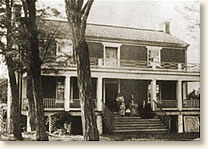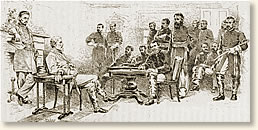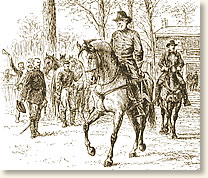With his army surrounded, his men weak and exhausted, Robert E. Lee realized there was little choice but to consider the surrender of his Army to General Grant. After a series of notes between the two leaders, they agreed to meet on April 9, 1865, at the house of Wilmer McLean in the village of Appomattox Courthouse. The meeting lasted approximately two and one-half hours and at its conclusion the bloodliest conflict in the nation's history neared its end.
Prelude to Surrender
On April 3, Richmond fell to Union troops as Robert E. Lee led his Army of Northern Virginia in retreat to the West pursued by Grant and the Army of the Potomac. A running battle ensued as each Army moved farther to the West in an effort to out flank, or prevent being out flanked by the enemy. Finally, on April 7, General Grant initiated a series of dispatches leading to a meeting between the two commanders.
"General R.E. Lee, Commanding C.S.A.:
5 P.M., April 7th, 1865.
The results of the last week must convince you of the hopelessness of further resistance on the part of the Army of Northern Virginia in this struggle. I feel that it is so, and regard it as my duty to shift from myself the responsibility of any further effusion of blood by asking of you the surrender of that portion of the Confederate States army known as the Army of Northern Virginia.
U.S. Grant, Lieutenant-General"
The note was carried through the Confederate lines and Lee promptly responded:
"April 7th, 1865.
General: I have received your note of this date. Though not entertaining the opinion you express of the hopelessness of further resistance on the part of the Army of Northern Virginia, I reciprocate your desire to avoid useless effusion of blood, and therefore, before considering your proposition, ask the terms you will offer on condition of its surrender.
R.E. Lee, General."
Grant received Lee's message after midnight and replied early in the morning giving his terms for surrender:
General R.E. Lee, Commanding C.S.A.:
Your note of last evening in reply to mine of the same date, asking the conditions on which I will accept the surrender of the Army of Northern Virginia, is just received. In reply I would say that, peace being my great desire, there is but one condition I would insist upon,--namely, that the men and officers surrendered shall be disqualified for taking up arms against the Government of the United States until properly exchanged. I will meet you, or will designate officers to meet any officers you may name for the same purpose, at any point agreeable to you, for the purpose of arranging definitely the terms upon which the surrender of the Army of Northern Virginia will be received.
U.S. Grant, Lieutenant-General"
The fighting continued and as Lee retreated further to the West he replied to Grant's message:
"April 8th, 1865.
General: I received at a late hour your note of to-day. In mine of yesterday I did not intend to propose the surrender of the Army of Northern Virginia, but to ask the terms of your proposition. To be frank, I do not think the emergency has arisen to call for the surrender of this army, but, as the restoration of peace should be the sole object of all, I desired to know whether your proposals would lead to that end. I cannot, therefore, meet you with a view to surrender the Army of Northern Virginia; but as far as your proposal may affect the Confederate States forces under my command, and tend to the restoration of peace, I should be pleased to meet you at 10 A.M. to-morrow on the old state road to Richmond, between the picket-lines of the two armies.
R.E. Lee, General."
Exhausted from stress and suffering the pain from a severe headache, Grant replied to Lee around 5 o'clock in the morning of April 9.
"April 9th, 1865.
General: Your note of yesterday is received. I have not authority to treat on the subject of peace. The meeting proposed for 10 A.M. to-day could lead to no good. I will state, however, that I am equally desirous for peace with yourself, and the whole North entertains the same feeling. The terms upon which peace can be had are well understood. By the South laying down their arms, they would hasten that most desirable event, save thousands of human lives, and hundreds of millions of property not yet destroyed. Seriously hoping that all our difficulties may be settled without the loss of another life, I subscribe myself, etc.,
U.S. Grant, Lieutenant-General"
Still suffering his headache, General Grant approached the crossroads of Appomattox Court House where he was over taken by a messenger carrying Lee's reply.
"April 9th, 1865.
General: I received your note of this morning on the picket-line, whither I had come to meet you and ascertain definitely what terms were embraced in your proposal of yesterday with reference to the surrender of this army. I now ask an interview, in accordance with the offer contained in your letter of yesterday, for that purpose.
R.E. Lee, General."
Grant immediately dismounted, sat by the road and wrote the following reply to Lee.
"April 9th, 1865.
General R. E. Lee Commanding C. S. Army:
Your note of this date is but this moment (11:50 A.M.) received, in consequence of my having passed from the Richmond and Lynchburg road to the Farmville and Lynchburg road. I am at this writing about four miles west of Walker's Church, and will push forward to the front for the purpose of meeting you. Notice sent to me on this road where you wish the interview to take place will meet me.
U. S. Grant, Lieutenant-General."
 The McLean family sits on the porch of their home. The surrender was signed in the 1st floor room on the left. |
The exchange of messages initated the historic meeting in the home of Wilmer McLean. Arriving at the home first, General Lee sat in a large sitting room on the first floor. General Grant arrived shortly and entered the room alone while his staff respectfully waited on the front lawn. After a short period the staff was summoned to the room. General Horace Porter described the scene:
"We entered, and found General Grant sitting at a marble-topped table in the center of the room, and Lee sitting beside a small oval table near the front window, in the corner opposite to the door by which we entered, and facing General Grant. We walked in softly and ranged ourselves quietly about the sides of the room, very much as people enter a sick-chamber when they expect to find the patient dangerously ill.
The contrast between the two commanders was striking, and could not fail to attract marked attention they sat ten feet apart facing each other. General Grant, then nearly forty-three years of age, was five feet eight inches in height, with shoulders slightly stooped. His hair and full beard were a nut-brown, without a trace of gray in them. He had on a single-breasted blouse, made of dark-blue flannel, unbuttoned in front, and showing a waistcoat underneath. He wore an ordinary pair of top-boots, with his trousers inside, and was without spurs. The boots and portions of his clothes were spattered with mud. He had no sword, and a pair of shoulder-straps was all there was about him to designate his rank. In fact, aside from these, his uniform was that of a private soldier.
Lee, on the other hand, was fully six feet in height, and quite erect for one of his age, for he was Grant's senior by sixteen years. His hair and full beard were silver-gray, and quite thick, except that the hair had become a little thin in the front. He wore a new uniform of Confederate gray, buttoned up to the throat, and at his side he carried a long sword of exceedingly fine workmanship, the hilt studded with jewels. His top-boots were comparatively new, and seemed to have on them some ornamental stitching
 Signing the surrender From a contemporary sketch. |
General Grant began the conversation by saying 'I met you once before, General Lee, while we were serving in Mexico, when you came over from General Scott's headquarters to visit Garland's brigade, to which I then belonged. I have always remembered your appearance, and I think I should have recognized you anywhere.'
'Yes,' replied General Lee, 'I know I met you on that occasion, and I have often thought of it and tried to recollect how you looked, but I have never been able to recall a single feature.'"
The two generals talked a bit more about Mexico and moved on to a discussion of the terms of the surrender when Lee asked Grant to commit the terms to paper:
"'Very well,' replied General Grant, 'I will write them out.' And calling for his manifold order-book, he opened it on the table before him and proceeded to write the terms. The leaves had been so prepared that three impressions of the writing were made. He wrote very rapidly, and did not pause until he had finished the sentence ending with 'officers ![]() appointed by me to receive them.' Then he looked toward Lee, and his eyes seemed to be resting on the handsome sword that hung at that officer's side. He said afterward that this set him to thinking that it would be an unnecessary humiliation to require officers to surrender their swords, and a great hardship to deprive them of their personal baggage and horses, and after a short pause he wrote the sentence: 'This will not embrace the side-arms of the officers, nor their private horses or baggage.'
appointed by me to receive them.' Then he looked toward Lee, and his eyes seemed to be resting on the handsome sword that hung at that officer's side. He said afterward that this set him to thinking that it would be an unnecessary humiliation to require officers to surrender their swords, and a great hardship to deprive them of their personal baggage and horses, and after a short pause he wrote the sentence: 'This will not embrace the side-arms of the officers, nor their private horses or baggage.'
Grant handed the document to Lee. After reviewing it, Lee informed Grant that the Cavalry men and Artillery men in the Confederate Army owned their horses and asked that they keep them. Grant agreed and Lee wrote a letter formally accepting the surrender. Lee then made his exit:
"At a little before 4 o'clock General Lee shook hands with General Grant, bowed to the other officers, and with Colonel Marshall left the room. One after another we followed, and passed out to the porch. Lee signaled to his orderly to bring up his horse, and while the animal was being bridled the general stood on the lowest step and gazed sadly in the direction of the valley beyond where his army lay - now an army of prisoners. He smote his hands together a number of times in an absent sort of way; seemed not to see the group of Union officers in the yard who rose respectfully at his approach, and appeared unconscious of everything about him. All appreciated the sadness that overwhelmed him, and he had the personal sympathy of every one who beheld him at this supreme moment of trial. The approach of his horse seemed to recall him from his reverie, and he at once mounted. General Grant now stepped down from the porch, and, moving toward him, saluted him by raising his hat. He was followed in this act of courtesy by all our officers present; Lee raised his hat respectfully, and rode off to break the sad news to the brave fellows whom he had so long commanded."

General Lee leaves
From a contemporary sketch.
References:
Buel, Clarence, and Robert U. Johnson, Battles and Leaders of the Civil War, Vol. IV (1888, reprint ed. 1982); Grant, Ulysses S., Memoirs and Selected Letters, Vol. I (1885, reprint ed. 1990); McPherson, James M., Battle Cry of Freedom: The Civil War Era (1988).
How To Cite This Article:
"Surrender at Appomattox, 1865," EyeWitness to History, www.eyewitnesstohistory.com (1997).


